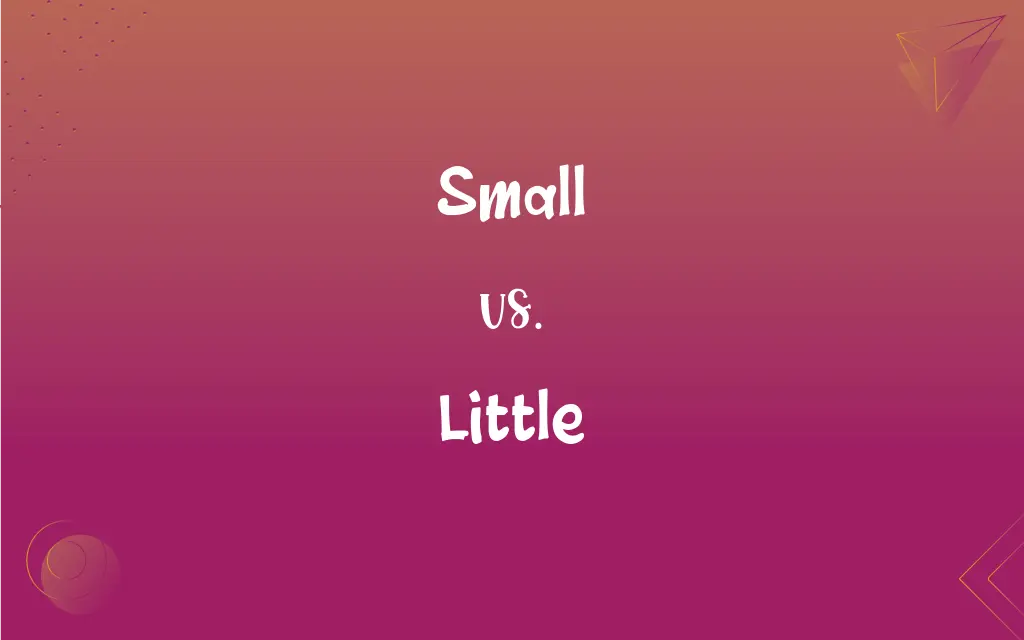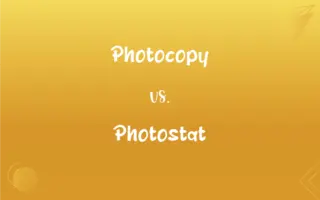Small vs. Little: What's the Difference?
Edited by Aimie Carlson || By Janet White || Published on January 5, 2024
"Small" refers to size, indicating something is not large or significant, while "little" can also imply a small amount or degree, often with a more subjective or affectionate tone.

Key Differences
"Small" is typically used to describe the physical size of objects, suggesting limited dimensions. "Little" often conveys a sense of quantity or degree, and can carry an emotional or qualitative aspect.
In context, "small" is more objective, generally referring to tangible, measurable aspects. "Little" can be more subjective, sometimes used to express endearment or minimize significance.
"Small" is often used in a neutral or factual manner, such as describing the size of an item. "Little" can imply a lesser degree or amount, often used in contexts beyond physical size.
In comparison, "small" is straightforward, focusing on physical attributes. "Little" can introduce a qualitative or emotional dimension, reflecting the speaker's perspective.
"Small" tends to be used in more formal or technical descriptions. "Little" is versatile, fitting into informal, affectionate, or diminishing contexts.
ADVERTISEMENT
Comparison Chart
Primary Usage
Describes physical size
Describes amount, degree, or size with additional connotations
Objectivity
More objective and measurable
Can be subjective or emotional
Contexts
Neutral, factual descriptions
Emotional, qualitative, or minimizing contexts
Formality
Common in formal or technical descriptions
Used in both formal and informal settings
Emotional Connotation
Generally lacks emotional connotation
Can convey affection or endearment
ADVERTISEMENT
Small and Little Definitions
Small
Small refers to limited physical dimensions.
She lives in a small apartment.
Little
Little refers to a small amount or degree.
There's little sugar left in the jar.
Small
Small is used for quantitatively insignificant items.
The small details matter in a project.
Little
Little is used to denote younger or smaller in age or size.
Her little brother is six years old.
Small
Small can describe a minor role or importance.
She played a small part in the play.
Little
Little can be used to minimize the extent of something.
It's a little problem, easily fixed.
Small
Small often pertains to limited scale or scope.
They operate a small business.
Little
Little often carries an emotional or affectionate tone.
She gave a little smile.
Small
Small indicates lesser in size compared to others.
He chose the small cup of coffee.
Little
Little can express minimal degree or importance.
He had little to say about the matter.
Small
Being below average in size
A small car.
Little
Small in size
A little dining room.
Little
Small in quantity or extent
A little money.
A little work on the side.
FAQs
How is little used differently than small?
Little often implies a small amount or degree, sometimes with emotional connotations.
Can small be used for quantities?
Yes, but it usually refers to physical dimensions.
Is little subjective?
Often, as it can convey personal perceptions or emotions.
What does small mean?
Small refers to something with limited size or significance.
Can small describe time?
Yes, as in "a small moment."
Is little appropriate in formal writing?
It depends on the context and tone.
Are small and little interchangeable?
In many contexts, but little has additional connotations.
Does little imply less importance?
It can, especially in phrases like "little importance."
Is little used in technical descriptions?
Rarely, as it's more qualitative.
Can small be diminishing?
Yes, but without the emotional tone of little.
How is little used affectionately?
In endearing contexts, like "little one."
Can small refer to a young age?
Less commonly than little.
Can small be used emotionally?
It's less common, as small is usually more factual.
Is small used in everyday language?
Yes, frequently for describing size.
Is small more objective?
Generally, as it's less influenced by personal perception.
Can small be affectionate?
Not typically, it's more neutral.
Can small express a degree?
Yes, but it's more about size or scale.
Can little mean 'very small'?
Yes, especially in colloquial usage.
Does little always mean young?
Not always, but it's common in that context.
Does little have multiple meanings?
Yes, it's versatile in use.
About Author
Written by
Janet WhiteJanet White has been an esteemed writer and blogger for Difference Wiki. Holding a Master's degree in Science and Medical Journalism from the prestigious Boston University, she has consistently demonstrated her expertise and passion for her field. When she's not immersed in her work, Janet relishes her time exercising, delving into a good book, and cherishing moments with friends and family.
Edited by
Aimie CarlsonAimie Carlson, holding a master's degree in English literature, is a fervent English language enthusiast. She lends her writing talents to Difference Wiki, a prominent website that specializes in comparisons, offering readers insightful analyses that both captivate and inform.






































































